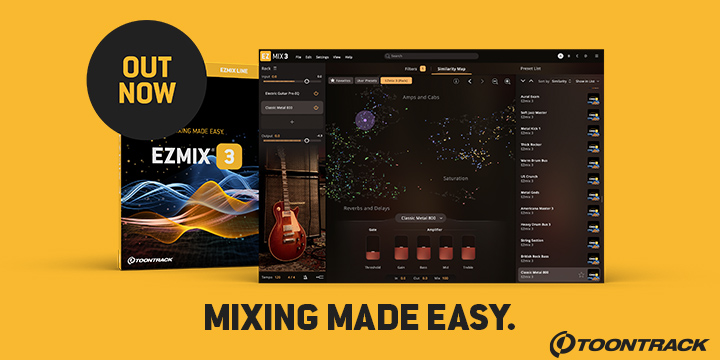
VirSyn has released version 3.0 of TERA, a huge update which adds a wealth of new features.
New features:
- Multi sampling: Each of the three main oscillators can now use samples instead of the built-in waveforms. The samples are organized in up to 16 key zones and 2 morph zones, making for a total of up to 32 sample files for each oscillator. Due to it's high quality re-sampling algorithm, you can use a single sample for the whole tonal range.
- Terrain filter: This new module allows for real-time morphing between two 16 pole filters selectable from a set of predefined vocal filters.
- Arpeggiator: In addition to the high-level arpeggio functions of the built in sequencer, TERA 3 now offers a simple standard arpeggiator for each part.
- Stereo routing: The amplifier module now has two additional stereo inputs allowing for stereo effects inside the synthesis patch. The spectrum oscillator has a new stereo output for stereophonic wavetable synthesis.
- Envelopes: The four multi-segment envelopes in TERA can now be used in a new "free" mode where each envelope can be used independently. These envelopes can be saved and loaded from special envelope presets. The standard envelope generators have also gotten a new Attack/Decay only mode.
- Spectrum oscillator: The Spectrum oscillator has many new functions:
- Uncorrelated stereo output.
- Spectrum presets.
- Separate spectrum parameters for two sets of oscillators.
- Wavelet synthesis.
- Walsh function synthesis.
- Operator synthesis.
- Voltage controlled amplifier (VCA): This new module works just like a ring modulator, except here one input is used to modulate the amplitude of the other input.
- New module inputs: The outputs of the envelopes and the LFOs can now be used as inputs for the signal processing modules of TERA. Previously, these outputs could only be used in the modulation matrix.
- New Modulation sources: Two modulation sources have been added:
- Key alternate: can be used to get a different sound on every other note (i.e. like bow up/down in natural string instruments).
- Key random: creates a random control signal on every note.
- Modulation matrix: The modulation matrix has been given a copy/paste function for transferring modulations between presets. Modulated parameters are indicated in the user interface through a color change of the parameter knobs.
- 8D control: The 8D morph control of TERA is now also usable for the six special synthesis pages introduced in TERA 2. The controller settings can be copied and pasted between presets and each dimension can be labeled individually.
- "Fly over" tool tip help system: You can get more information on a particular parameter by moving the mouse over it, revealing a small window with detailed parameter info.
- New sounds: The new TERA sound banks contain 256 presets, including some from sound designer Howard Scarr. For the new sample module a set of ~35MB of multi-samples is included. In addition to the traditional bank structure all presets are now available in a hierarchical folder structure for easy sound categorization and searching.
General changes:
- MIDI controller editor for easier assignment of MIDI controllers to parameters.
- Selection fields (e.g. Wave selection) can now be assigned to MIDI controllers.
- Receive MIDI input from multiple devices simultaneously.
- Scroll wheel can be used for parameter adjustments on Windows XP.
- Smaller user interface makes plugin usage more convenient.
- Parameter fine adjustment control with Shift+Drag function.
- Glissando function (chromatic glide).
- Each Sequencer part can now control an external synthesizer (Windows XP).
- RTAS plugin for windows XP and OS X.
TERA 3 is available for Windows and Mac OS X and it looks like it will still cost €299 for new purchasers. Upgrades are available for existing owners and demo versions are available.



 Other Related News
Other Related News